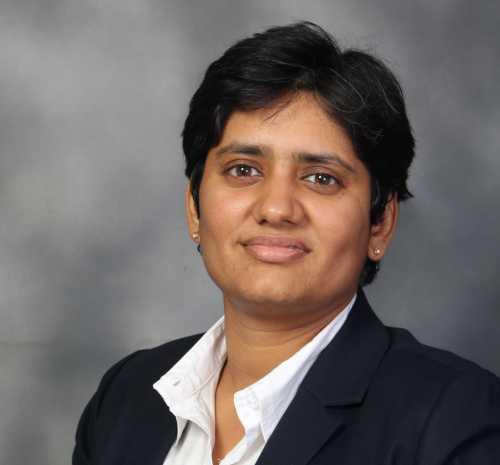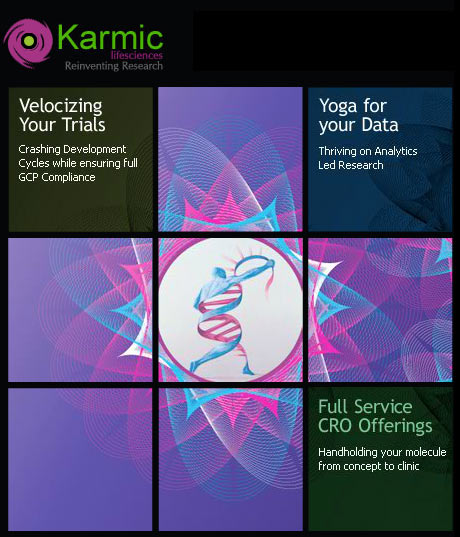
Nidhi Saxena, founder of Karmic Lifesciences, a contract research organisation that was born in the bleak days of mid-2008, reveals what made her venture a success in four years.
Just as the global economic meltdown of 2008 was gathering storm in the US, a doughty Indian, based in New York, was busy shaping the contours of her entrepreneurial dream in the land of her birth.
The fact that she had a Master Six Sigma Black Belt and years of hands-on experience having worked with biggies like GE, Wipro, Hexaware and WNS came in handy during the turbulent 2008-09 when she bootstrapped. However, venturing into an altogether new area posed its own challenges.
Nidhi Saxena knew too well the pitfalls of starting a contract research organisation company (The company offers services like clinical trial management, clinical data management, regulatory consulting on contract basis to biotech and pharma companies). But she was equally confident that her crystal clear vision would help her sail through the rough and tumble of entrepreneurship.
Interestingly though, the global economic turmoil turned out to be a blessing in disguise for her company Karmic Lifesciences that was registered in 2005 but began operations only in June 2008 (read on to learn why).
"We started our business at a time when the world economy was spiralling downwards. That helped us get a low-cost business model up and running quickly," says the 34-year-old.
Almost four years since then, Karmic, based out of Airoli Special Economic Zone in Navi Mumbai, is talking about expansion.
Nidhi, who was born and brought up in Allahabad in Uttar Pradesh, migrated to Mumbai to study commerce and later got her management degree from the SP Jain Institute of Management Studies, Mumbai. She has been in and out of Mumbai, Hyderabad, New York and New Jersey ever since only to come back to India in 2008. Here, she shares the challenges of being an entrepreneur, her success mantras, and offers advice on how start-ups looking for funding should impress venture capitalists.
Also read: The amazing success story of INSEAD dean Dr Dipak Jain

Inspiration to start out on your own...
The desire to do something of my own is inborn. As a child I was very rebellious and knew my mind. Within six years of joining the work force I decided to become an entrepreneur. I registered Karmic as a company in 2005 (it cost me Rs 10,000) but actual operations started in June 2008 when I quit my job in the US to become a full-time entrepreneur.
Working with companies like Wipro, GE and Hexaware, having an entrepreneurial DNA, honed my skills. In fact, I gained exposure in IT, finance, business and people management, while working for these companies.
You registered your company in 2005 but started your operations in 2008... what took you so long?
I was working full-time in New York and did not have the money to begin operations. In 2008, we got an order from a global Big Three pharma company and funding from New Jersey-based angel investors, and bingo we were in business.
How did you get the multi-million rupee breakthrough with the global Big Three pharma company? How did you convince them for your first order?
The pharma major was looking for a low-cost IT solution for data management of Phase IV clinical studies and they wanted it within a month. We managed to launch the software in 30 days and that was our first breakthrough. The same company then gave us a Rs 1 crore order for four additional studies.

The ups and downs of your entrepreneurial journey...
The first challenge was to gain the know how in the clinical research area, as I was an outsider in the industry. So I met up with a lot of doctors at different fora, visited J J Hospital and told them I want to start a contract research organisation. I learnt a whole lot about clinical trials for oncology and cardiovascular diseases and the safety aspects.
The second issue was funding. I read up on how to fund start-ups. Three books --Hi-Tech Start-Ups (John L Nesheim), Crossing the Chasm (Geoffrey A Moore) and The Fountainhead (Ayn Rand) -- were a great help.
While MBA unravels the theoretical concepts of starting and managing a business, the way companies are valued is learnt on the job. Things like income tax registration, service tax registration and other administrative aspects of a start-up business aren't taught in the classroom.
I was fortunate to have a two mentors who taught me what it takes to be an entrepreneur -- Rusi Brij and Sanjeev Varma. Brij was the CEO of Hexaware, my first cousin and first investor. He gave me a lot of insights into this business.
Then there was my guru, Sanjeev Varma who worked with Chrysler Corporation and is currently based in the US and on the board of several venture groups.

How did you get your seed capital?
While in New Jersey I made several presentations and convinced investors from Indian Angel Network who invested Rs 1.5 crore in 2008.
How did you impress your first venture capitalists?
I think they liked the vision and clarity of my business plan. It was very short, to the point, it had all the aspects of a scalable model and was presented with passion and fire.
I was very confident and articulate, had a diversified industry experience and track record and strong sales background. So the VCs thought there was a good chance of me getting the business in -- which is the first major challenge for any start-up.
They liked my ambition which was not to create a Rs 50 crore company but a Rs 500 crore company. From Day One we have been thinking about scale and while we have had a straight line growth so far, after three years (of operations) the trajectory will just take off vertically.
What is the size of Karmic Lifesciences now?
Currently, we have about 80 employees and will be 100 strong in the next few months. In terms of revenue, we are growing at compunded rate of 350 per cent a year and we are profitable.
Your expansion plans...
We hired 50 new resources this year and will hire another 30 to 50 for two new verticals -- pharmacovigilance and licensing. We are looking for skilled people with MD, PhD, MBBS, degrees for senior level positions and some of them will typically be MSc (Clinical Research), MPharms, BHMSs and BAMSs. So the required hires will be either modern or non-modern medicine doctors or management professionals for the support functions.
In terms of quality we are looking out for people with strong scientific and subject matter expertise with an ability to gel into a highly non-heirarchical and entrepreneurial culture where they will have to set up the systems and processes.
What's your immediate target for Karmic Lifescience and when do you think you will achieve this target?
By 2015 we should be a $ 25 to 30 million company.

We started our business at a time when the world economy was spiralling downwards, which helped us get a low-cost business model up and running quickly.
I think passion and vision are the first two mantras of success. Unless I am very passionate about my business and harbour a crystal clear vision, I can never succeed. Most people think in terms of 10 per cent or 30 per cent salary hikes a year whereas entrepreneurs think in terms of changing the world!
Team building and people management skills are the second most important quality to be successful. Just having a vision is of no use unless you can translate and transfer that energy into the group of people who will be pillars of strength in the long term. So creating a culture of empowerment helps achieve one's goals.
Third, persistence and determination to take you through big and substantial setbacks. In the first year of operation, there were situations when we thought that we were about to go bankrupt. There were times we didn't have money for salaries, and recently we lost a very big order -- in the region of Rs 10 crore – because of the safety issue at the sponsor end. However, the ability to look at the big picture under these circumstances and push yourself and your team to think of creatively keeps the ball rolling.
The fourth is innovation, creativity and out-of-the-box thinking. As a start-up you are always constrained for funds and your only tool for staying ahead of competition is differentiation.
So for a start-up it is making more with less.

Your job experience and lessons you learnt on the go...
I have worked for quite a few wonderful companies. GE Capital, one of the biggest companies in the world, is known for its processes, quality and the Six Sigma methodology.
I am a Master Six Sigma Black Belt and learnt from hands-on operations at GE. From Wipro Technologies, I learnt to manage marketing, branding and intranet based and automated support operations.
Further, Azim Premji's style of operation -- very, very low profile, not too communicative, always focussed on the job -- which turned Wipro into a four-billion dollar powerhouse, inspired me.
I was instrumental in establishing Hexaware's BPO division and was involved in every activity from creating the initial business plan to hiring, to getting the first few large orders. The experience at Hexaware taught me how to set up and run a company and was a valuable learning ground.
Today their BPO division has revenues of more than $ 45 million.
With WNS I spent a lot of time in New York and learnt to connect with the venture capitalist community and close large B2B deals. I closed a few $3-4 million deals with a couple of big banks. Each of these deals and the interaction with senior clients gave me a different type of learning.

Dos:
Don'ts: